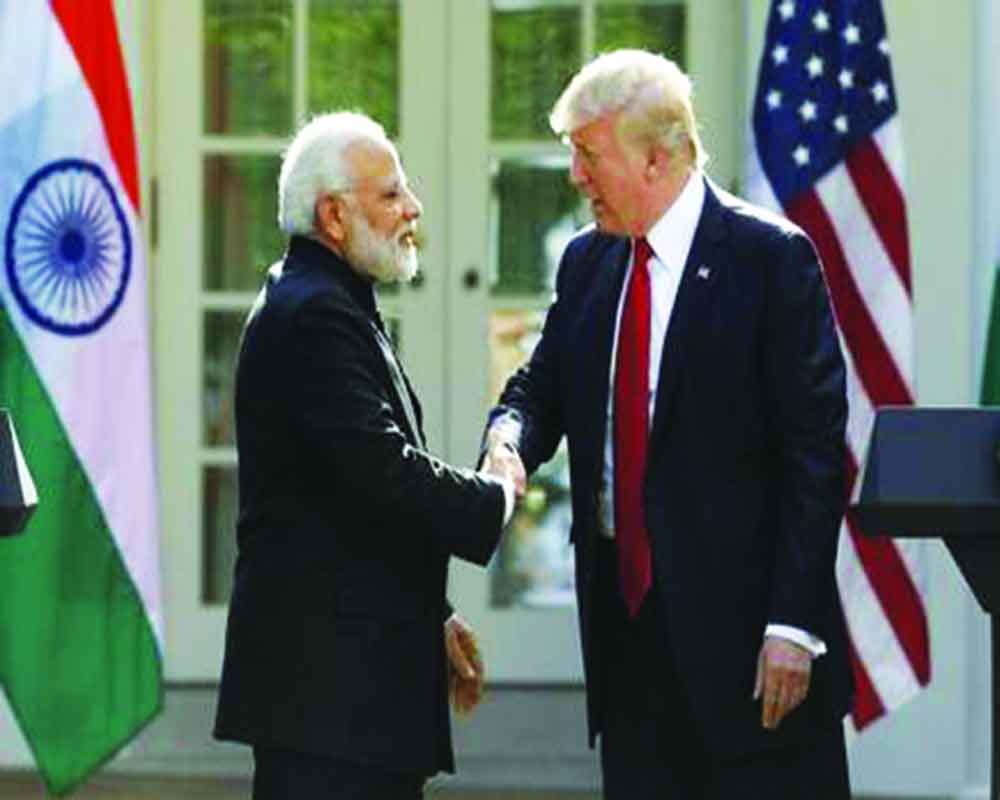
Deal? Or no deal?
by Opinion Express / 13 February 2020Trump came to power telling his voters how the world, India included, treated the US unfairly. Will he get his trade pact?
Donald Trump’s bestselling book is titled, Trump: The Art of the Deal. But after he surprised everyone, possibly even himself, and became the 45th President of the US, he has found it difficult to even locate a canvas on which he can paint his masterpiece. Much of the global peace dividend of the past 75 years following World War II has, thanks to the US, given access to its immense market to countries across the world. Trump and many of his core supporters believe that this access has been granted “unfairly.” Take the example of China, which is one of the biggest beneficiaries of the US’ benevolence. It has not been given reciprocal rights to American companies in its home turf and has indeed become a strategic threat to the US. India, too, has been a beneficiary of such benevolence. For years, we have gained from its Generalised System of Preferences (GSP) scheme that allowed a certain amount of duty-free imports. But Trump’s trade negotiators nullified that and with some justification, too. Given that the US claims that India is hardly a “developing economy” and a part of the G20, we have been declared ineligible for such benefits. Trump also believes that India has some extremely protectionist trade rules, high rates of customs and excise on goods. His go-to refrain has been for the American motorcycle manufacturer Harley-Davidson, whose imported big two-wheelers have been subjected to some harsh duties. But with India’s economy in the doldrums, what access can it offer to companies in the US is the moot question.
So as Trump heads to India for a State visit, a deal may be on the cards. Logically, it would primarily focus on defence where India is seen as a bulwark against Chinese expansionism. But what about trade? India may possibly do a bit of a reversal against the increasingly protectionist and import-substitution route that the Government has been following. But Indian negotiators are as stubborn as American ones and even though Trump and Prime Minister Narendra Modi may sign some papers, the impact of what those papers say and how they will be operationalised eventually will possibly be similar to the papers Trump signed with Kim Jong-Un of North Korea.
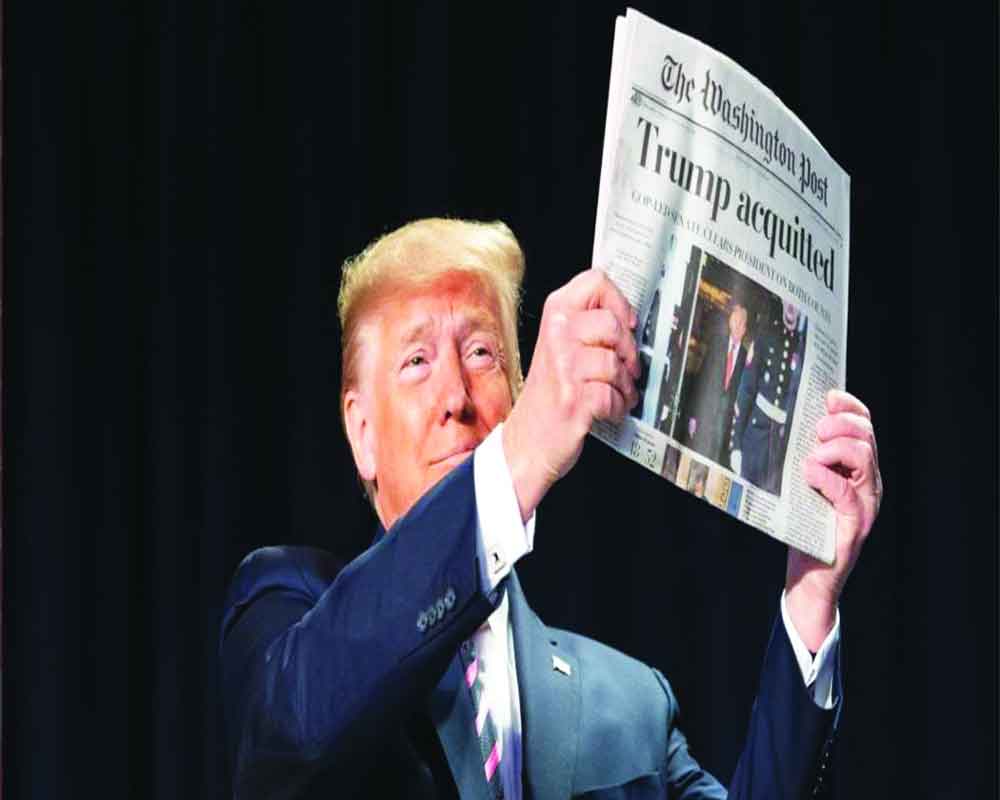
Hijacking the narrative
by Bhopinder Singh / 10 February 2020Under the aegis of Trump, the Republican movement of classical conservatism has veered sharply towards hard protectionism, isolationism, populism and above all confrontationism
Various polls that seek to ascertain the greatest President in the US’ history have almost always ranked Abraham Lincoln as the nation’s most esteemed leader. Lincoln, the quintessential statesman, was also the first Republican President who is remembered for his Gettysburg Address, which posited the Grand Old Party’s (GOP as the Republican Party is known) progressive commitment towards liberty, equal rights, republicanism and democracy. Beyond unmatched statecraft with dignity, aplomb and humility, Lincoln was known to be personally sympathetic, magnanimous and accommodative of “others.”
The Republican Party of Lincoln was indeed founded on the noble impulses of anti-slavery, social progression and liberality. Today, the same party has an incumbent President in the White House, Donald Trump, who enjoys the highest-ever approval rating for any President from within the same party i.e, 95 per cent (such polls are a 20th and 21st century phenomenon only). The Republican movement from classical conservatism has veered sharply towards hard protectionism, isolationism, populism and above all, confrontationism.
In this era of Republicanism, forget basic courtesies afforded by Opposition party colleagues, even own partymen are not spared. Take the example of Trump’s public anger against former Republican-presidential candidate Mitt Romney, “Had failed presidential candidate @MittRomney devoted the same energy and anger to defeating a faltering Barack Obama as he sanctimoniously does to me, he could have won the election.” Romney’s ostensible crime was that he had taken a position on Trump’s impeachment notice by stating, “The best we can do in the Senate is strive to meet the obligations outlined by our founding fathers — to honour our Constitutional duty and fulfil our oath to do impartial justice.” This style of language and expression is clearly out of place in Trump’s Republican Party.
Trump is no versed Republican ideologue and has brazenly changed party affiliation five times, including that to the principal Opposition party, the Democrats. In 2004, he had said, “I probably identify more as a Democrat.” He returned to the Republican Party only in 2012 and by 2016, won the presidential contest as a Republican candidate. Political and personal flip-flops notwithstanding, today, Trump has firmly ensconced himself at the centre of redefining his party’s moorings that has very little bearing to the one under Lincoln. The party’s perfunctory “11 principles of American renewal” includes one on “values”, which ironically states, “Our country should value the traditions of family, life, religious liberty and hard work.”
Trump’s complete grip on the Republican Party’s fate is exemplified by party Chairwoman, Ronna Romney McDaniel, who is a personal nominee and Trump’s sworn loyalist even though she is the niece of fellow Republican Senator, Romney. For good measure, McDaniel (she had presciently dropped her middle name) tweeted obligingly, “This is not the first time I have disagreed with Mitt and I imagine it will not be the last. The bottom line is President Trump did nothing wrong and the Republican Party is more united than ever behind him.”
So what explains the phenomenal success of a President who is known to lie more frequently than a human washes hands? Washington Post’s fact-checker had documented 10,796 presidential statements in 869 days that were either misleading or outright lies. This calculates to more than 12 lies a day. Trump slams any inconvenient fact or query as “fake news.” He incredulously stated, “What you’re seeing and what you
are reading is not what’s happening.”
Clearly, Trump’s brashness and bravado at “getting even” with the historically-perceived snootiness and indulgences of the intelligentsia (read Democrats or the progressive/moderate elements within the Republican Party) appeals to the most basic of basic instincts — among those who are made to believe that they are sufferers of “historical injustices.” This spirit of “undoing the past” is carefully reposed and invoked in the rallying cry of “Make America Great Again.” It resonates subliminally and powerfully as it cuts across societal faultlines and feeds the latent racist, anti-immigrant, protectionist and nativist instincts. Constituents feel redeemed and vindicated as Trump tramples on the sophisticated logic and concerns of those who disagree.
A reclaimed sense of identity is inherent as Trump pooh-poohs climate change, abuses allies, disengages from multilateral bodies like the UN and in the world of a new Republican Party even own members are not spared the venom. At the funeral ceremony of the iconic Republican Senator Warrior John McCain, where Trump was specifically not invited, his daughter lamented, “The America of John McCain has no need to be made great again because America was always great.”
Of the major candidates challenging Trump for the Republican nomination in the 2020 presidential bid, the number one challenger is Bill Weld with just 1.31 per cent of popular votes as against 97.15 per cent for Trump. The number two challenger, Joe Walsh, with 1.08 per cent popular votes conceded, “I think it’s important that there’s a Republican out there every day who says, this is not my Republican Party. This is not what I believe in. I’m not cruel. I’m not bigoted.” Yet, it is Trump who will emerge as the inevitable pick of the Republican Party in 2020. The Trump stranglehold over the Republican nomination is complete and as the date of electioneering beckons, personal, moral and ideological integrity becomes increasingly immaterial in the face of hard factors like winnability. Above all, “the only other option”, which is assiduously painted as abject surrender, may hem with immigrants and basically enfeeble the American Dream.
Besides Lincoln, the party, which prided on the likes of Thomas Jefferson, Theodore Roosevelt, Dwight D Eisenhower and such-like distinguished statesman, is now poised to re-host an ideological suspect, who has left no stone unturned to personally polarise and divide the nation as its winning candidate. Now, Trump is the first sitting President to seek re-bid after being tried for impeachment. Fear-mongering, personalised insults, innuendoes and brooking no contrarian opinion within his party has done the trick.
(Writer: Bhopinder Singh; Courtesy: The Pioneer)

A ‘patriotic’ cover-up
by Bhopinder Singh / 05 February 2020While the authoritarian system allows for mobilisation of resources, it also pushes a dangerous culture of auto-denying ‘bad news’ that allows a problem to fester
In February 2003, an American businessman travelling from China got afflicted with pneumonia-like symptoms while on a flight to Singapore. En route the flight had stopped at Hanoi and the businessman was rushed to a hospital where he soon died. Many others in the medical staff attending to him also developed the same disease and an Italian doctor, Carlo Urbani, recognising the severity of the strange viral threat, alarmed the World Health Organisation (WHO) – later, he too succumbed to the mysterious virus. Three months earlier, the SARS (Severe Acute Respiratory Syndrome) epidemic had indeed accounted for its first casualty in the Guandong province of China and many more had followed, but China had deliberately kept the news under wraps from the WHO and did not announce the outbreak till the virus and the “bad news” had gone beyond its controllable borders. The initial Chinese cover-up had resulted in a crucial time-lag that had facilitated the spread of the SARS epidemic. Later China apologised for its “slowness” but only after 800 lives were lost in the first global pandemic of the 21st century. A local Chinese whistleblower doctor, who was among the first to report about the mysterious SARS outbreak, was subsequently demonised as a “bad” citizen and placed under house-arrest as he had ostensibly brought disrepute to the nation!
Seventeen years hence, yet another airborne virus has broken out in the city of Wuhan with the lessons of the SARS mishandling remaining essentially unlearnt. What has changed in the last 17 years has been the sure emergence of the new “superpower” China on the global highway, which is even more intolerant to anyone, anything and any news that could apply brakes towards its believed destiny. China is not only among the countries with the most restrictive media environment, it is also the most sophisticatedly controlled domain that barely allows a squeak to filter out. The recent examples of putting the virtual media gag on mammoth scale societal dissonances like the Uighur “re-education camps” or the Hong Kong protests are uniquely China, which is forever in a state of paranoia against the prospects of any negative news filtering out. Towards this end, it “manages” the media through a variety of means, from brazen bans, coercion, threats to even simply “buying out” silence (usually in the case of vassal countries like Pakistan, North Korea etc). Such an environmental hypersensitivity has only heightened in the recent times and all potentially negative news are immediately slammed as “unpatriotic rumours.”
This militates in the face of undisputable development that has taken place in the fields of infrastructure, technology, socio-economic parameters and so on. Ironically, the city of Wuhan also hosts one of the most advanced research laboratories in the field of epidemic research. Such a dominating governance instinct puts the entire credibility of the exact situation, scale and control measures in question as the news emanating from China is solely from the governmental agencies and filtered through lenses.
Reacting to the basic precautionary measures taken by most countries, the state’s mouthpiece Global Times made space for some irresistible realpolitik: “Starting Sunday, the US barred foreigners who have travelled to China within the past 14 days from entering the country, far beyond the World Health Organisation (WHO) declaration that does not recommend travel and trade restrictions for China. The US was the first country to take such an extreme measure, setting a bad example worldwide.” Meanwhile, Zeng Guang, the chief epidemiologist of the Chinese Centre for Disease Control and Prevention, has admitted to the initial slackness due to “lack of scientific recognition” and also owing to “probably some executive issues.” The Chinese government is still playing down the impact of the latest outbreak, even though the infectivity of this virus has far surpassed that of the 2003 SARS epidemic.
While the Chinese reaction has probably been more intensive as compared to 2003 SARS in terms of building makeshift hospitals, requisitioning emergency medical staff from the People’s Liberation Army (PLA) and round-the-clock construction of related facilities, the strict denial of any foreign or even independent reportage of the outbreak remains unchanged. China was already reeling under an overheated economy with the lowest growths recorded in nearly three decades. The added challenges of punishing trade-wars with the United States and unending Hong Kong protests, were further taking their toll. Now, estimates abound of additional lost growth of between $60-70 billion or a further drop in GDP by two percentage points in the first quarter of the year. The fear of continuing “bad news” could lead to an unavoidable extension of the Lunar New Year holidays, keeping the shutters on the factories that would further cripple economic activity and impact global supply chains.
All in all, the economic, social, diplomatic and strategic cost to China will be very damaging, but it has the reserves, capacity and wherewithal to “pull through” yet another crisis. What will become increasingly difficult going forward is the ability of the regime to continuously “cover up,” should the common man on the street feel the pinch, post the crisis. China has its hands full on many fronts simultaneously and its ability to weather the multiple storms will be tested as its economic health will not be as robust as it was earlier. China could utilise the situation to either “open up” itself or further clamp down on censorship in order to sustain a government-fed narrative. More likely than not, regime-insecurity will ensure authoritarian impulses and preferences. While the authoritarian system allows for unprecedented mobilisation of resources, it also fosters a dangerous culture of auto-denying “bad news” that allows a problem to prolong itself longer than it would normally have, had the issue been tabled in all transparency. The invocation of “patriotism” to cover up tragedies is the bane of all single-party regimes. The lessons of SARS may have been incorporated in terms of building infrastructural capacities to manage crises. But the Xi Jingping era has only worsened on democratic freedoms and transparency. The Coronavirus saga exemplifies that.
(Writer: Bhopinder Singh; Courtesy: The Pioneer)

Iran’s loss, ISIS’ gain
by Anil Gupta / 02 February 2020The terror group stands to gain much from the assassination of Iranian General Soleimani, who was the face of armed resistance against it in Iraq and Syria
Not very long ago, December 2017 to be precise, the world was celebrating the defeat of the Islamic State (ISIS), the deadly face of terror that had compelled the world powers with differing strategic interests to come together to defeat it and along with it the idea of a medieval Islamic Caliphate. The ISIS had succeeded in recreating it by capturing swathes of territory in Iraq and Syria, including oil fields, refineries and mine fields of strategic minerals.
The aura of the ISIS was such that it not only attracted thousands of jihadists from different parts of the world, including Europe, but also dared to challenge the might of the United States (US) by executing and beheading American citizens. The menace of ISIS grew so fast and rapidly that the entire world was unanimous in countering the threat posed by it. Qaseem Soleimani, an Iranian General, was the face of armed resistance against the ISIS in Iraq and Syria along with the USA, Russia, Turkey and its European allies. Soleimani contributed in a big way in the defeat of the ISIS. The US and Iran, adversaries in the Middle East, identified a common enemy in the ISIS and effectively fought together against it to eliminate the terror group’s de facto state in Iraq and Syria. However, realpolitik soon overtook the strategic convergence of interests with Iran and the US almost at the verge of a war with a renewed Middle East crisis.
The ongoing US-Iran crisis reached the peak last month with US President Trump authorising the killing of General Qaseem Soleimani, the head of Iran’s Islamic Revolutionary Guard’s elite Quds Force and an American ally in the fight against ISIS while he was on a visit to Iraq. This raised the tensions between the US and Iran to a new level with the future of the US forces in Iraq in the doldrums.
It also let loose many Shia militias which Soleimani had carefully raised and groomed to counter and challenge the ISIS. Their focus all of a sudden shifted from combatting ISIS to their newly-emerged enemy, the US assets and troops in the Middle East. Under the threat of Iranian retaliation, even the focus of Americans and others has been diverted from the ISIS and other radical Islamist jihadi terror groups for the time being. If at all there was a clear winner of the ongoing US-Iran conflict, it was undoubtedly the terror organisation. It has provided the ISIS with the much-needed oxygen as well as time and space to reorganise and regroup.
As a result, the US and its allies now face the dual threat of Shia militias and the Sunni radical Islamist jihadi terror groups led by the ISIS. The fall of Soleimani has provided them a new opening. The growing demand of ejecting US forces from Iraq has further complicated the security scenario in the region and in the process hurt the efforts to counter ISIS which have suffered a serious blow.
My assessment when Iraq’s Prime Minister declared a final victory over Islamic State in December 2017 was that the “ISIS may have been defeated but it was not destroyed. It may have been disseminated but was not dissolved.”
According to Goldenberg, an American diplomat who had served as Special Advisor in the Middle East between 2009-12, “The ISIS retains an underground presence and could take advantage of the chaos of an American withdrawal or a US-Iranian conflict to improve its position in Iraq.”
The assessments are seeming to be proving true with increased frequencies of terror attacks by the ISIS after the elimination of General Soleimani. The upheaval created by his killing has given rise to such conditions in Iraq that the ISIS is ever-willing to exploit.
The weakening of the Shia militias as a consequence to absence of Soleimani’s charisma as well as sterling leadership qualities will definitely weaken the Iraqi Government which would create a space for the ISIS and other Sunni terror groups to stage a comeback in the region.
Moreover, the US focus shifting towards defending its bases in Iraq and the security of green zone, will allow the terror group to manoeuvre more freely. The ISIS fighters, who had dispersed and gone underground are now rebuilding and re-emerging fully recuperated as a potent threat in form of insurgency, Improvised Explosive Devices, bombings, targetted killings suicide attacks, sniper attacks and lone wolf attacks. It is too early to assess if they would continue with this tactics or attempt once again to establish an Islamic Caliphate.
The US is trying to put up a brave front by denying any surge in the activities of the terrorist organisation due to its own activities. It is also obstinately claiming that most of the recent attacks by the group may have been planned well before the killing of Soleimani (because of the time and resources required to plan and execute such operations, more so when the ISIS is suffering from a unified command crisis and dispersion of its fighters). But the fact remains that with a divided focus it has become increasingly difficult for the US to contain the terror group.
The flare-up in the US-Iran crisis has certainly provided opportunity to Abu Ibrahim al Qurayshi — the newly- appointed successor of the assassinated long-time ISIS leader Abu Bakr al Baghdadi — to strengthen his grip and revitalise the terror outfit to intensify its attacks in the region.
Under Qurayshi’s leadership, the group may also attempt to regain lost territories in Syria and Iraq depending on the resistance it faces, as this would give the new chief an opportunity to establish his hold more firmly over the group and prove his mettle.
The ISIS attacks on US-backed Kurdish-led Syrian Democratic Forces have also intensified during the last month. The group is also trying to restore and rejuvenate its social media wing, its main source of funding and recruitment. Disturbingly, the terrorist group’s propaganda sites are on the rise on various social media platforms and apps.
The re-emergence of ISIS would have a definite impact on the Afghanistan-Pakistan region (Af-Pak region) with its consequential fallout for India and regional peace and stability in South Asia.
Soleimani’s successor, Brigadier General Ismail Qaani, is an old hand at fomenting trouble in Afghanistan and Pakistan. Solemani himself had played an active role in Afghanistan by cooperating with the Northern Alliance to fight the growing might of the Taliban. In a later turn of events after the American invasion of Afghanistan, Iran courted Taliban to fight the Americans and other Western troops in Afghanistan. General Qaani, who till as late as 2018 was the Iranian deputy Ambassador to Afghanistan, was instrumental in managing Iran’s Afghan policy.
Pakistan has also been accused of cross-border terror in Sistan- Baluchistan by Iran. Tehran is opposed to the rise of any Sunni-fundamentalist regime on its eastern border and with Pakistan now assisting the US to forge a deal with the Taliban, Iran has further been angered.
Shia-Sunni violence in Pakistan and persecution of Shias remains a constant point of friction between Iran and Pakistan. Thus a US-Iran conflict may have an impact in the situation in Afghanistan with Iran turning a blind eye to the rise of ISIS in the Af-Pak region as a complimentary threat to the US. In the process, Iran will try its best to derail the Afghan peace process. While Iran may have its own axe to grind in Afghanistan and sort out Pakistan as well for promoting the American interest in the region, rise of ISIS will have adverse impact on India’s security.
ISIS may well use Pakistan and Bangladesh as launch pads to renew its threat of Ghazwa-e-Hind. India will have to be cautious and watchful and at the same time strengthen its intelligence apparatus to counter the emerging challenges.
(Writer: Anil Gupta; Courtesy: The Pioneer)
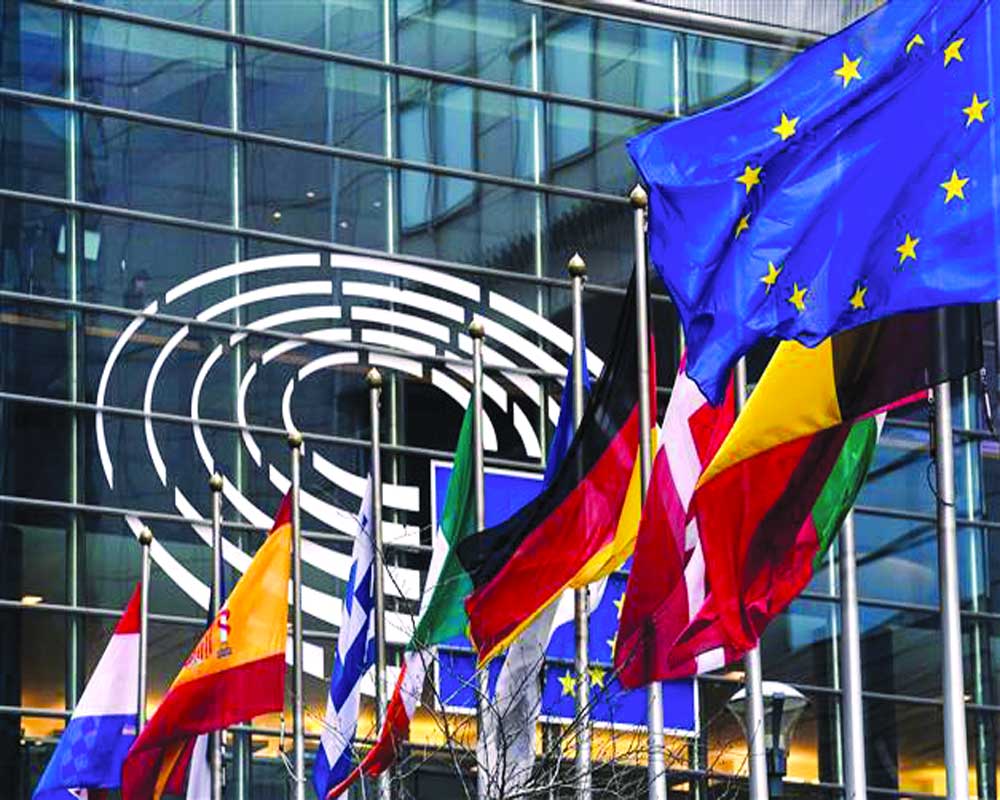
A censure too far
by Opinion Express / 28 January 2020India has rightly ignored the EU resolutions on CAA, argued the law is an internal matter but we must dispel doubts
It is perhaps a little hypocritical of the European Union (EU) to go so far as to pass resolutions against the Citizenship Amendment Act (CAA) when it has traversed a spectrum of genocidal politics and refugees born of racial hatred itself. That’s patronising. India is capable enough to conduct its own democratic scrutiny. Yes, all is not right with the new law that makes religion a criterion for naturalisation. And the civil society dissent against it has indeed become a pan-Indian movement to act as a counter-pressure to the Government. Both the law, which was duly passed by Parliament, and the mass protests thereafter, are within democratic convention. Though the Government clampdown on discourse is reprehensible, the recent protests have shown how masses of people can effectively turn the tide while being leaderless and without political endorsement. To that extent, the pro and anti-CAA battle will be settled within the spirit and territoriality defined by the Constitution and may actually set us on the self-corrective course of democratic renewal. We certainly won’t need any third-party intervention to make that call, India’s citizens are enough to do it. Domestic matters, no matter how contentious, will have to be solved domestically. Fellow democracies indeed need to respect that.
Also, such resolutions mean nothing unless they are a precursor to some sort of practical curbs in EU’s engagement with India (some EU members have suggested that as well) but that’s an extreme option, considering there are nations with worst rights violations. Unless of course, this is being done to negotiate a stronger position when Prime Minister Narendra Modi visits Brussels for an Indo-EU summit. Having said that, the international narrative does shape global perceptions and attitudes in engaging with India. And the resolutions embody unanimity of opinion from the extreme Right to extreme Left groups, coming from 625 of 752 EU members. Sifting through them, certain key issues do come up on which the Government has to ready its explainers and demonstrate that it is receptive as a vibrant democracy and not combative like an authoritarian regime. It has to engage with counterpoints than scare them away. The key concerns are clearly about the marginalisation of a community implicit in the CAA, its link with the profiling nature of census in the National Population Register (NPR)-National Register of Citizens (NRC) and the clampdowns on dissent, including those in Kashmir following its changed status as a Union Territory. The resolution, which falls under the category of “resolutions on topical subjects,” says that India has “created the legal grounds to strip millions of Muslims of the fundamental right of equal access to citizenship” and has linked the rights situation in Kashmir. The US, too, despite the guided tour of the Valley, has been critical of the detention of mainstream political leaders, who have so far worked within India’s democratic template and even been allies of New Delhi, without formal charges. The viral images of an emaciated, bearded and unkempt National Conference leader Omar Abdullah have only intensified the sense of victimhood at the hands of an oppressive regime. Till date, the Government’s lobbying and efforts to push its own point of view have not been too convincing. It has not made any reconciliatory moves either except by countering criticism with an obstinate aggression that is sharpening polarities. We must realise that intransigence is not always an asset even as we attempt to reset the template of diplomacy from passive to aggressive.
(Courtesy: The Pioneer)
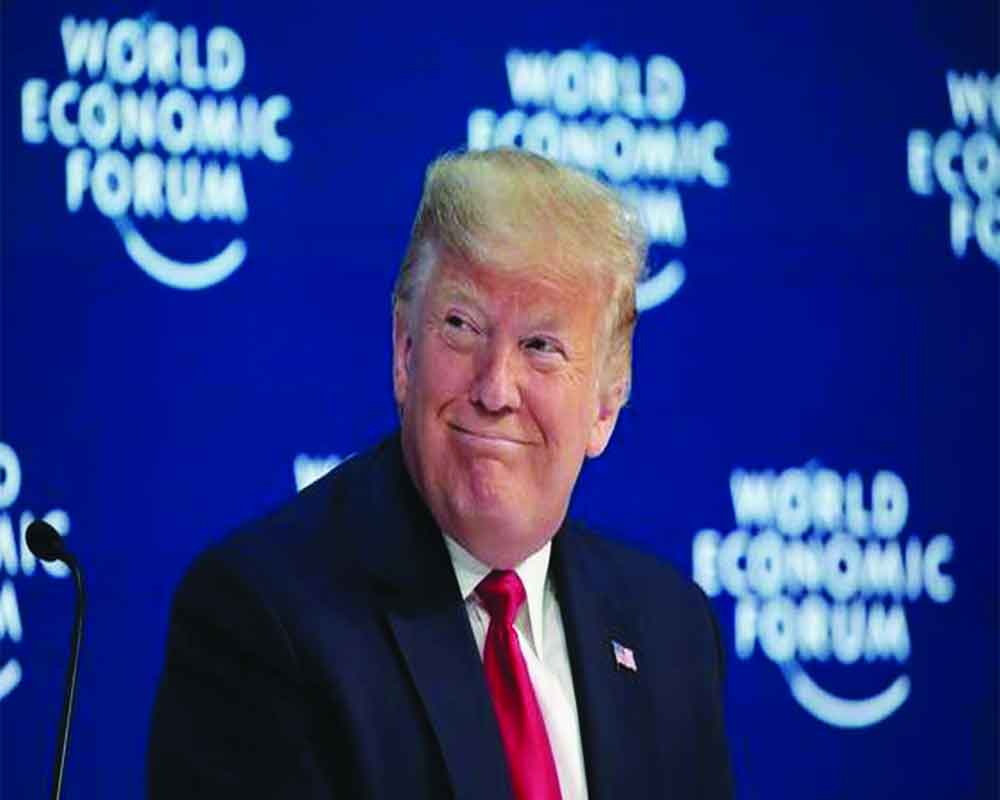
Listen to the teenage zealot
by Opinion Express / 27 January 2020One does not have to buy into Greta Thunberg’s apocalyptic angst to see that something has to be done on climate change. Changing to a cleaner energy future is a good thing in itself
An unfamiliar white patina covered our lawn recently, something seldom seen any longer, certainly not here in the South: A frost. For the first time this year, I considered digging out my heavy coat from the depths of the cupboard but it wasn’t really cold enough.
Where have our winters gone? I miss them. No doubt having written those words, the country will freeze for the next month but there is no sign of anything remotely wintry in the long-term forecast anywhere in the country, not just in London. It is hard to recall an old-fashioned winter where it would snow at least two or three times between December and April.
This mild pattern is noticeable across the entire European continent and has been for some time now. In Moscow, the authorities sprayed fake snow around the city centre over the New Year to give the residents a sense of the season. The temperature in the Russian capital last week was 4oCelsius; usually it is -10oCelsius or lower.
I remember visiting Moscow in late January and it was -25oCelsius, with the River Moscva frozen so solid you could drive across it. They used to call it General Winter — weather so ghastly that it was an integral part of Russia’s defences, repelling Napoleon and Hitler, among others. Now it’s not even Lance-Corporal Slightly Chilly.
All the great eastern and central European cities — Berlin, Warsaw, Vienna and St Petersburg — are exceptionally mild, though winter could yet have a sting in the tail. The so-called Beast from the East that arrived late in the season a few years ago temporarily shocked us out of our complacency but it was relatively short-lived and not that exceptional in any case.
Mild Januaries are now the norm. We have a lovely old wooden toboggan that has hardly been put to use since the 1980s, which is the last time I can remember a succession of cold winters. Growing up in Kent in the 1960s and 1970s, heavy frosts and blizzards were an annual occurrence. Not now.
I am reluctant to attribute what might prove to be temporary weather glitches to long-term climate change but there is clearly something going on that cannot be ignored. We don’t have to buy into the apocalyptic angst of Swedish environmental activist Greta Thunberg, on show again in Davos last week, to recognise that something has to be done.
Whether or not you are a sceptic about the impact of carbon dioxide on the climate or question man’s involvement in producing the greenhouse gas, our energy future is a non-carbon one, like it or not. Virtually every Government across the world has committed to this as an overt aspect of public policy and those that haven’t, like China or the US, have a rapidly growing green energy sector poised to exploit the move to a carbon-free future.
If US President Donald Trump wants to be remembered for anything other than being impeached, he would throw his weight behind it because it is happening anyway, even in his own backyard. American greenhouse gas emissions are falling despite his commitment to fossil fuels.
Perhaps Trump would be persuadable if he were to recognise there is a hard-headed economic imperative here. He should listen to someone like Marco Alvera, an oil and gas CEO who understands what is going on and has ideas to address it.
At a conference in Venice at the weekend, he said we should commit to the one clean energy source that is plentiful, easy to transport and getting cheaper to produce. It is all around us, does not have to be drilled out of the ground in parts of the world favoured with the right geology and does not pollute the atmosphere. It is hydrogen, the most widespread element in the universe. Like many businesses reliant upon carbon-based energy, Alvera’s Italian energy infrastructure company, Snam, has no long-term future unless it adapts because its pipelines, compressors and storage tanks will be useless as oil and gas come under pressure from state actors around the world. They can be used for hydrogen instead.
However, this is more than just a commercial calculation. Alvera has published a book compellingly setting out the case for Governments, manufacturers and investors to get behind hydrogen now before they head off down other less-promising blind alleys.
Hydrogen can be burned to drive a turbine, can be piped into homes for boilers, cookers and air conditioners and converted into electricity using a fuel cell to power a car or a lorry. Unlike wind and solar power, it is easily
stored and can generate the intense heat needed by industrial processes including manufacturing steel and cement. The only waste product is water.
True, there is nothing new about the concept. Fuel cells were developed in the mid-19th century and some buses were running on hydrogen in Germany and Britain in the 1930s. There are cars today that have been converted to hydrogen but they are expensive and there is no infrastructure to support them. Manufacturers like Toyota are developing hydrogen cars with their Mirai range but few others are following suit. They should.
In the past, hydrogen has been too expensive relative to fossil fuels but that will change as new taxes are loaded onto coal and gas to meet carbon dioxide targets and the cost of renewable energy continues to fall. No one pretends the transition will be straightforward but if there’s widespread adoption of the technology and the necessary infrastructure, it will become increasingly affordable.
This is a reasoned, not a hysterical, approach. Alvera likes to adapt the argument known as Pascal’s wager to our climate change conundrum. The 17th century French philosopher and mathematician asked what we should do if we had to bet our lives on the existence of God. Pascal posited that the rational response was to behave as though he did exist because we have nothing much to lose if it turns out that he doesn’t but risk eternal damnation if he does.
Climate change is the same. If Greta is right then the consequences of doing nothing are calamitous. But if she is wrong, changing to a cleaner energy future is a good thing in itself and can even generate growth and prosperity. You do not have to be a teenage zealot to see sense in that.
(Courtesy: The Pioneer, The Telegraph)
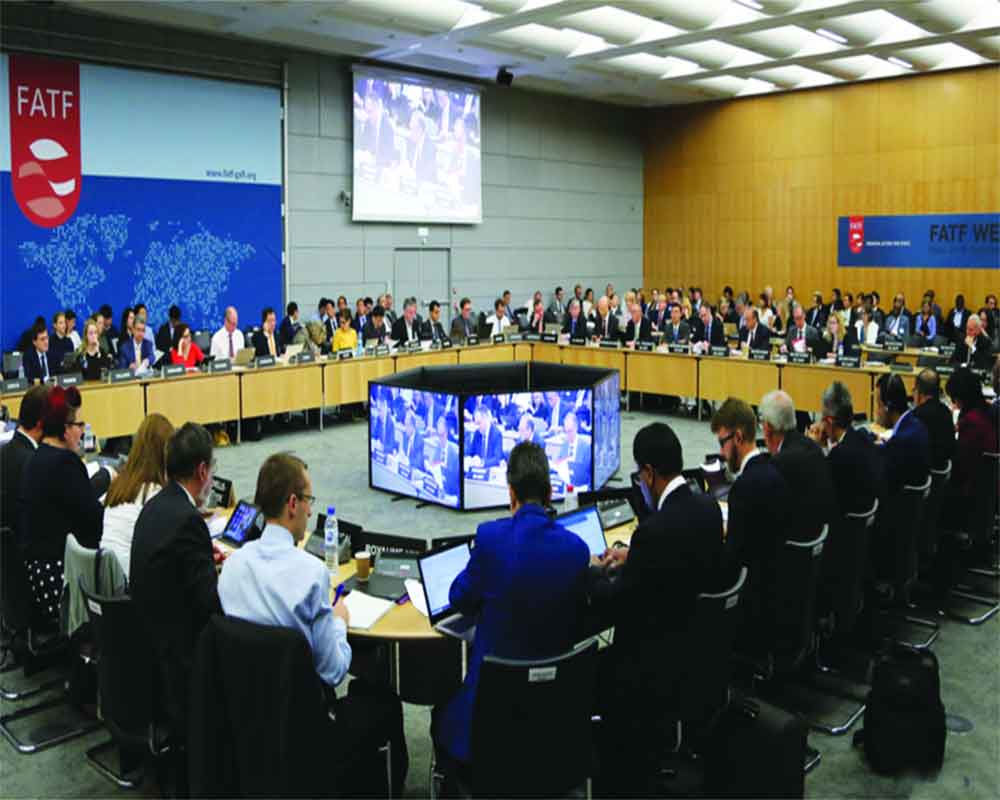
Reprieve for Pak
by Opinion Express / 25 January 2020With the US and EU now backing its counter-terrorism compliances at FATF, it may get out of the grey list
In the end, India has to evolve its own dynamic regarding Pakistan and its sponsored terror instead of focussing solely on isolating it diplomatically and amassing international opinion on its side. For the fluidity of geopolitics means that each nation would work out its tactical advantage in an evolving context and might not prioritise India’s concerns. And global politics is but transactional and revolving stakes mean shifting alliances. To that extent, even India’s wins are dictated by its economic potential. So it comes as no surprise that at a meeting of the Financial Action Task Force (FATF) — the global watchdog that tracks terror-funding States and can disqualify them from aid by World Bank and global institutions — members expressed satisfaction over Pakistan’s corrective compliances and counter-terrorism efforts. India’s was the lone voice of protest. What is of significance is that Pakistan has been able to convince the US, EU, Australia and even Japan about its efforts to curb terrorism. The change in position seems drastic considering last October, the FATF had found Pakistan wanting in most criteria — it had cleared only six of the 27 parameters — and pushed it dangerously closer to the dark grey and black lists. Now the chances of Pakistan “exiting” the grey list are brighter. This indeed would be a blow to India’s diplomatic lobbying and efforts. The support of China, its all-weather friend and FATF president, Turkey and Malaysia, with which Pakistan aspires to claim leadership of a neo-Islamic world, was but expected. But the US, while endorsing India’s position on Kashmir at the UN, is too invested in stitching up a deal with the Taliban in the final stages before it exits Afghanistan. So it needs Pakistan now. That explains the clean chit in Beijing and even the acknowledgement of Pakistan’s “great efforts” at course correction. The US may also have yielded ground at FATF because freezing aid to Pakistan could aggravate economic instability in the region with a cascading impact on politics. Pakistan has been driving home its arguments on this count with its Minister for Economic Affairs Hammad Azhar lobbying in Beijing over the past few days. Pakistan Prime Minister Imran Khan has been appealing to US President Donald Trump in Davos to help the country get off the “grey list.” China, of course, has been the accelerator, certifying Pakistan’s “political will and active efforts.” Not only this, it has been arguing for a renegotiation of the FATF brief itself, saying the grouping had no business to blacklist nations but should help them counter-terrorist funding and networks. India must realise that the shades of the FATF list mean nothing in terms of threat levels ever since the definition of blacklist was diluted as a “call for action” and the grey list was downgraded to “other monitored jurisdictions.”
If indeed Pakistan gets out of the grey list, it can avail international funding and clamber out of a choked economy. The conduits to Kashmir could be red hot again, not that they had stopped completely. And though we would want to believe that the Pakistani economy is stuttering, the fact is Moody’s upgraded its status from negative to stable, the Arab benefactors have sent grants with even Russia meaning to invest in north-south gas pipelines. Global penalties won’t impact Pakistan’s proxy war with India; the Government-military configuration will always keep that on the boil, prioritising it as a strategic interest. Even while staying on the FATF watch, there has been no cessation of terrorist infiltration into Kashmir. A listing won’t change that ground reality. Besides, as Khan’s sustained efforts to raise Kashmir at international fora show, the abrogation of Article 370 has completely taken down the pillar of Pakistan’s domestic and international policy. It certainly wouldn’t want to let go of the anti-India pitch as its bargaining worth. India has to be prepared for every such manoeuvre. At the same time, it has to ensure that there is no change in the international opinion of “Kashmir is a bilateral issue” argument, the pin-pricking offers of mediation by Trump notwithstanding. For this, the Government needs to demonstrate that it is not at war with the Valley and restore civil rights. This would go a long way in assuaging domestic critics in the US and EU, both of which are being pushed uncomfortably on human rights in Kashmir, and may have compulsions to humour the activist lobby as well. India, too, could make some move to demonstrate its seriousness about bilateral talks and seem to practise what it preaches. Our hardening stance would mean that the world will have a relaxed attitude towards our neighbour. In reality, the deterrence for Pakistan has to be our own measured call.
(Courtesy: The Pioneer)
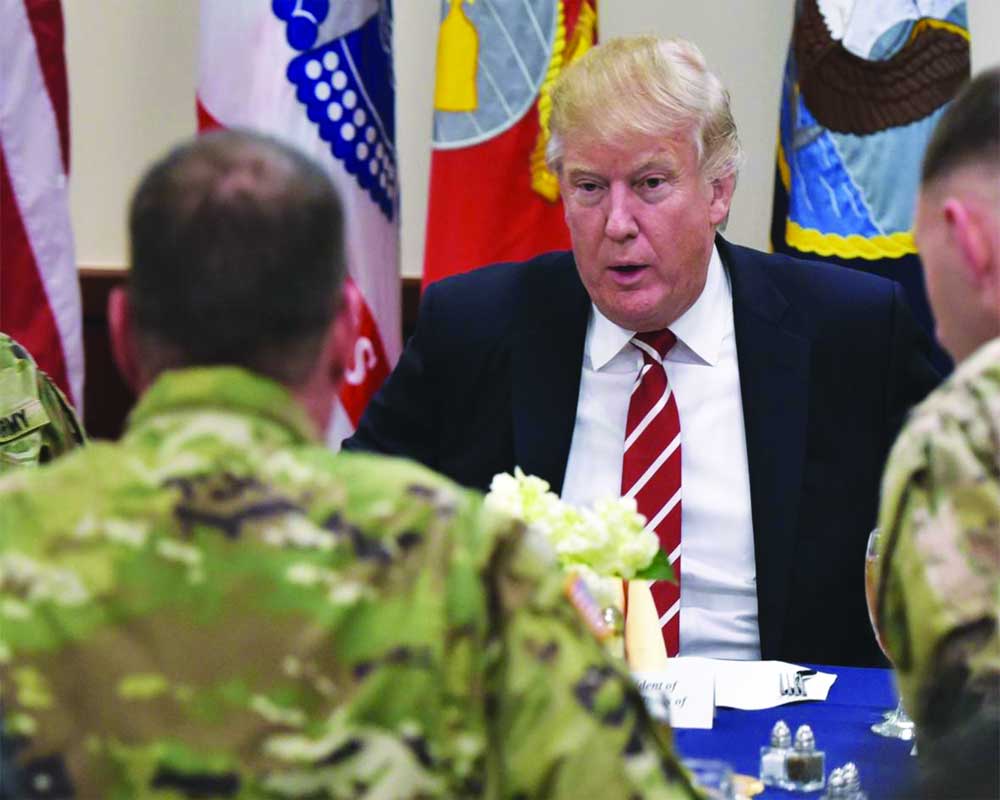
Illogic and the showman
by Bhopinder Singh / 24 January 2020The US under the Trump administration typifies the reckless decision-making of military imperatives without prior experience, counsel or professional advice
Traditionally, the US administration has benefitted from the military experience that resides in the “White House.” Prior to their political ascendancy, around 29 of the 45 US Presidents have held military experience. However, the incumbent President Donald Trump has been an exception. He has had a controversial past of medical deferment that purportedly kept him out of military enrollment during the Vietnam War. Post the World War II, in the midst of the cold war era, nine successive US Presidents were former combatants till the tenures of Bill Clinton, Barack Obama and now Trump. Even the US Congress and Senate have had a substantial presence of veterans (they represented more than half of Congress for much of the late 20th century), who have debated and drafted security policies in pursuance of national objectives.
Given that the post World War II period entailed bloody American military involvement in places like Korea, Vietnam, the Middle East, Somalia and Afghanistan as well as other covert wars and operations, the reassuring presence and understanding of the accompanying security sensitivities added the necessary nuance, steel and perspective on governance. But the last 12 years have seen a gradual reduction in the representation of veterans (till very recently) in both Houses. Trump though has displayed himself with misplaced enthusiasm for military trappings, bravado and parades to posit his own surrogate muscularity in pursuit of politics.
Most of his interventions, allusions and invocation with military imperatives have been high on instinctive showmanship and theatrics but have been low on efficacy. He started his tenure by appointing the iconic Marine Corps General James Mattis as the Secretary of Defence. The latter was found to be too rational, grounded and a well-read professional for Trump’s boorish and fickle preferences. The US President authorised the usage of the “mother of all bombs” (GBU-43/B Massive Ordnance Air Blast, the most powerful non-nuclear explosive) in Afghanistan. Today, he is negotiating “peace talks” with the Taliban, which has already accounted for well over 2,000 US casualties. He got the US military to rashly rain 59 Tomahawk cruise missiles (each costing approximately a million and a half dollars) on a dilapidated airbase and then another hundred on an industrial site in Syria, among other military commitments. Today, most Syrian lands have been lost to his bête noire, Bashar al-Assad’s Syrian Government.
Units of the US Special Forces, in conjunction with allies — Saudi Arabia and the United Arab Emirates — conducted operations along with supporting militias in the Yemen theatre. As a result, a ragtag Army of Iran-supported Houthi rebels have been cocking a snook at the much larger, affluent and better armed forces of the US and its allies. While he did get to “take out” a past his prime Abu Bakr al-Baghdadi and more recently the Iranian Commander of Quds Force, Major General Qassem Soleimani, the essential American foothold in the Middle East remains shaky and is desperately in need of a “pull-out” to limit further damage.
Taking militaristic decisions is inevitable for a superpower that is mired in protecting its hegemonic interests across the globe. However, recent decisions and the fate of the Trump-led US military’s involvement across the globe warrant serious introspection. It’s not that “team” Trump did not have competency but his impatience with reason and restraint has ensured that the likes of Mattis have left, got fired, joined his “echo chamber” or, as mentioned in the famously anonymous Op-ed in The New York Times, are part of the silent “resistance working within the Trump administration.” The Op-ed, authored by a senior person in the Trump administration, evocatively noted his leadership style to be “impetuous, adversarial, petty and ineffective.” Further, it went to express the conundrum of the hapless staff, who would “privately admit their daily disbelief at the commander-in-chief’s comments and actions.”
A thoroughbred professional, Mattis became a typical sufferer of Trump’s foolhardiness when he refused to carry out killing orders of Syrian leader Bashar al-Assad, to make war plans to attack Iranian facilities and opposed the decision of the US’ troop withdrawal from Syria. On Mattis’ resignation, the former combatant was hailed as the “last adult” in the Trump administration. Questions now abound if Soleimani would have been “taken out” today if Mattis was still around.
The decision to up the ante with Iran did have the backing of some veterans like four-star general Jack Keane and former Director of the Central Intelligence Agency David Petraeus among others. But as Congressman Adam Smith said, “Trump has no idea what he’s doing but isn’t afraid to do it.” This unheeding trait has led to multiple forms of military adventurism with little to show on the ground at a time when Trump is in the last leg of his first tenure.
The usual phenomenon of spectacular military actions, resulting in a bipartisan “rallying around the flag” and, thereby, bumping up the crucial presidential approval ratings, is an old hat (in all democracies). After the Gulf War, former US President George HW Bush’s approval ratings went up from 58 per cent to 89 per cent. His son, George W Bush’s invasion of Iraq got a similar spike from 58 per cent to 71 per cent. Barack Obama’s elimination of Osama bin Laden took his ratings from 44 per cent to 51 per cent. But Trump’s Soleimani action did not result in any noticeable jump. He continues to languish in the mid-40 approval percentages. Clearly, Trump has politically abused the “military card” too often and it no longer resonates. On the contrary, his embarrassing description of “beautiful weapons” in the serious business of deploying the “last resort” responsibly diminishes the statesmanship and restraint required of his position.
What deliberately polarising politicians like Trump also achieve is that they dangerously “divide” perceptions within the veteran community, which is usually bipartisan on security matters and goes by military “facts.” This sort of brazen politics has alienated the likes of Trump’s fellow Republican and former combatant Senator John McCain, whose professional integrity as a soldier was affronted by usurpers like him.
Matters of military need to be spared from political appropriations. Else, the required institutional ethos and perceptions are weakened. Following this, the overall national security preparedness, too, would stand diminished.
(Writer: Bhopinder Singh; Courtesy: The Pioneer)
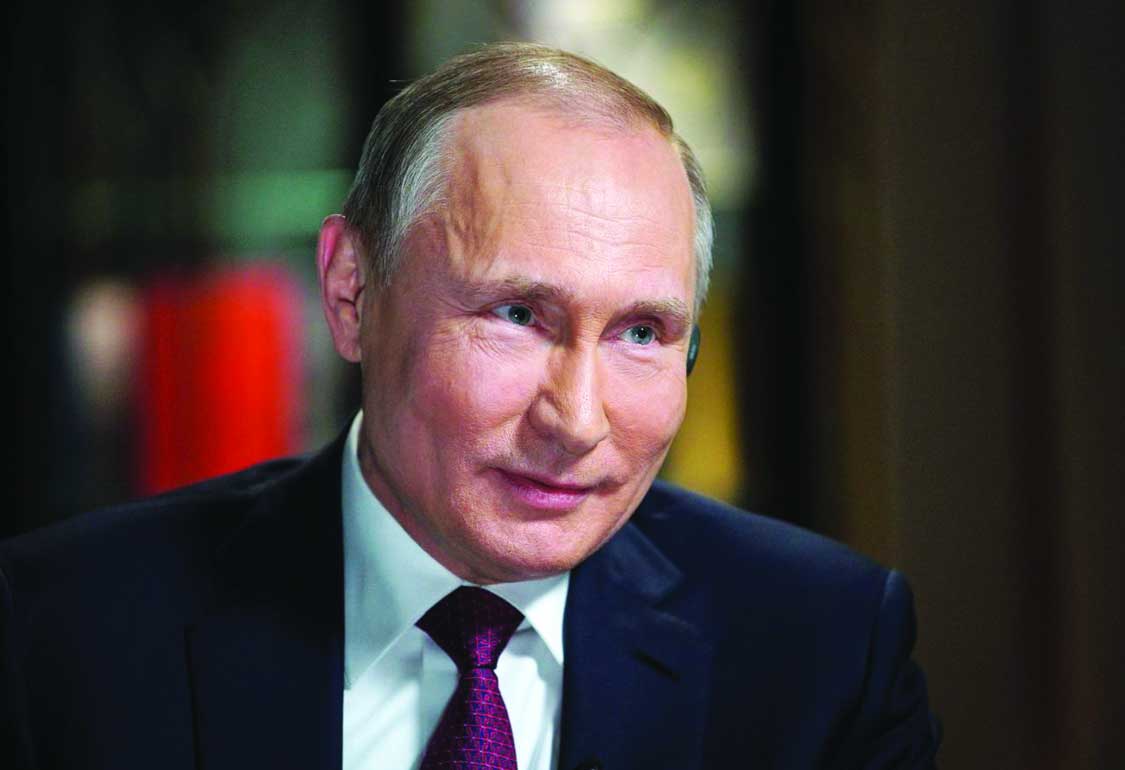
Putin’s Russia
by Opinion Express / 17 January 2020The resignation of the Russian Cabinet has paved the way for his plans to stay on in power beyond 2024
Vladimir Putin has now become the longest serving Russian leader since Joseph Stalin. No matter what opinion one may have of the current Russian leader with regard to the way he has ridden roughshod over any and all opposition, prima facie he is a lot nicer than Stalin, a man revered by the Communists in India, who was also one of the greatest mass murderers in history. Unlike Stalin, Putin also has to worry about a small thing called a Constitution. But after a shock decision by the Russian Cabinet to resign on Wednesday, it is clear that Putin will remain in charge well beyond 2024 when his second eight-year stint as Russian President will come to a close. And to do so, he will need to reform the Constitution. It’s worth noting that his Cabinet resigned not in a manner of protest but to make his life easier. After all, his long-time aide, former President and newly-resigned Prime Minister Dmitry Medvedev, was not expected to do anything but that. How Putin will structure his continued reign remains to be seen. Will he become the head of the State Council or amend the Constitution to ensure he remains President indefinitely?
However, unlike Chinese President Xi Jinping, who, too, made a power grab and changed the rules in the People’s Republic of China, Putin’s task is far tougher. First, unlike China, Russia is at least a quasi-democracy. The past three years have seen constant protests against Putin as Western sanctions against Russia have begun to bite. His claims that he is hearing the clamour for reforms within the country and that is what is prompting these “reforms” is, therefore, debatable. But more Putin also means that he will remain a major figure on the global stage. His intervention in Syria and Iran are of grave concern to the US and other Western nations. At the same time, he has made it very clear that he wants to see a revival of Russia’s international power, wants it to be a nation with the largest stockpile of nuclear weapons in the world and one that continues to develop new weapons technology. Russia punches well above its economic heft in the world. With Putin in charge, it possibly punches a weight category even higher. While many in Washington DC, London and other Western capitals would be glad to see the back of the man, these new reforms mean that he is not going away anytime soon unless the Russians want him to.
(Courtesy: The Pioneer)
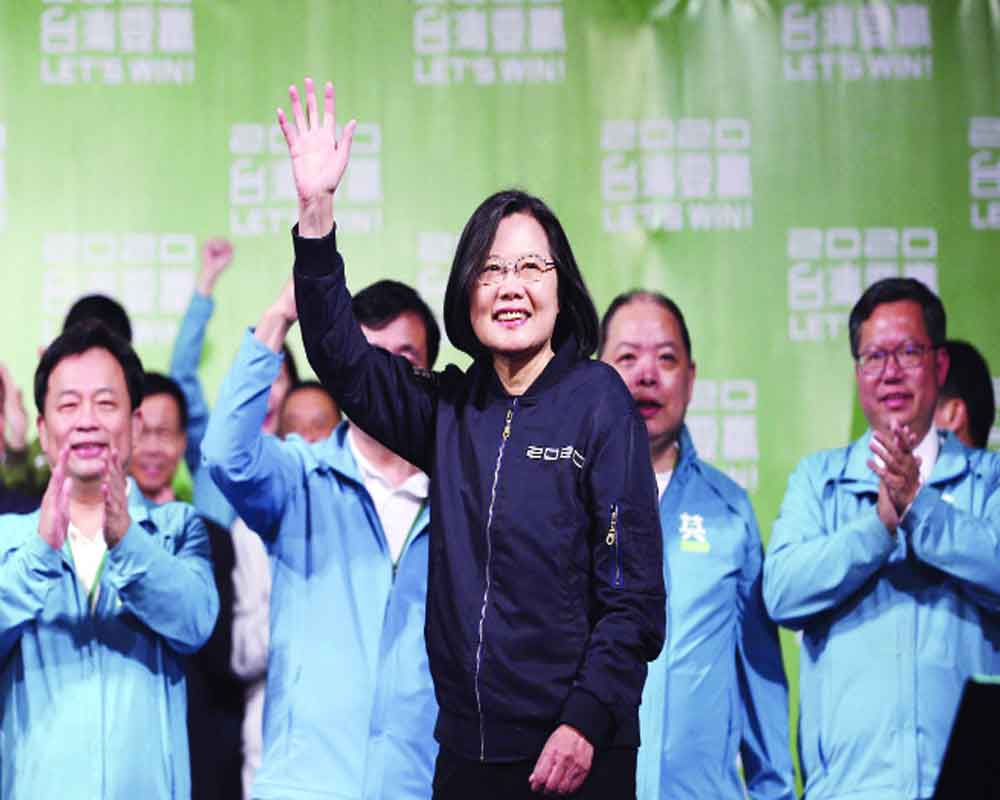
Lessons for China
by Claude Arpi / 16 January 2020Tsai’s presidential poll win and the Hong Kong local elections last year show the weakness of the Chinese regime, which remains dependent on propaganda and influence to bully its neighbours
The just-concluded presidential and legislative elections in Taiwan might remain a turning point in the life of not only the island but the entire region. President Tsai Ing-wen of the Democratic Progressive Party (DPP) defeated Han Kuo-yu from China-friendly Kuomintang by more than 2.5 million votes (57.1 per cent for Tsai and 38.6 per cent for Han). The former became the first-ever candidate to capture more than eight million votes. James Soong Chu-yu, chairman of the People First Party (PFP) close to China performed poorly with only 4.2 per cent of the votes. More than 14 million (out of 19 million eligible voters) participated in the vote, which also saw the DPP retain its majority in the legislature, winning 61 out of 113 seats.
Many observers saw this as a slap in the face of China and its President Xi Jinping. The problem for Beijing is that this is a second debacle in a row — in November 2019, the Hong Kong District Council elections were held for 18 seats when a record 71 per cent of the electorate had voted. The election was viewed by many as a referendum on pro-democracy protests that continued for six months. The results came as a jolt for Beijing; the Communist regime had never expected a “tsunami” in favour of the pro-democracy movement, which took control of 17 of the18 district councils.
At first, it looked as if Beijing did not know how to react. According to The South China Morning Post: “Xinhua waited [two days] to release a two-paragraph news report on the polls. It only stated that the elections took place and 18 districts produced results.” The next day, the People’s Daily went on talking about the history of US intervention in foreign elections. In the weeks preceding the elections, the Global Times repeatedly claimed that a “silent majority” in Hong Kong was condemning the protests.
An important common factor, the country’s mobilising youth, has been pointed out by Juang Wen-jong, professor of public policy and management at Shih Hsin University in The South China Morning Post: “Young people — or those between 20 and 39 — were the key to the weekend’s elections as they made up at least 6.6 million of the eligible voters in Taiwan… They helped bolster the turnout rate, which helped increase both the vote for Tsai and her party.”
Many considered the Taiwan’s presidential election to be a proxy contest about its national identity. This probably explains why Beijing was not amused. What has made matters worse for China is that many countries sent congratulatory messages to the new Taiwanese President. “China cried foul, claiming that their actions violated the ‘one-China’ principle,” wrote the Taiwan News.
The Taiwanese Ministry of Foreign Affairs (MoFA) had announced that officials from some 60 countries had greeted Tsai via phone call and email. It included US Secretary of State Mike Pompeo and Japanese Foreign Minister Toshimitsu Motegi. “In a released statement, Pompeo congratulated Tsai on her well-deserved win and praised Taiwanese voters for demonstrating the spirit of democracy.”
The word “democracy” makes China see red. China’s Foreign Ministry spokesperson Geng Shuang spoke of elections in “Taiwan region of China” and asserted that it was a “sub-national affair in China.” He added that Beijing deplores and firmly opposes “those countries” which violate the “one-China principle” by “offering the congratulations and lodged solemn representations.”
Geng declared that Beijing opposes any official relations between “the Taiwan region” and countries that have diplomatic ties with China. He asked these countries to deal with the issue “properly and with caution to avoid sending the wrong message to Taiwan’s independence forces.”
Beijing’s Taiwan Affairs Office (TAO) released a communiqué asking Taipei to adhere to the “1992 consensus” between China and Taiwan. Ma Xiaoguang, the TAO spokesman, said: “Our political policy towards Taiwan is clear and consistent. We adhere to the basic principles of peaceful reunification; one country, two systems and one China.” We will resolutely safeguard China’s sovereignty and territorial integrity, resolutely oppose any plot or act of “Taiwan independence” and resolutely promote the interests and “well-being of Taiwan compatriots.”
At the same time, Xinhua blamed Tsai and the DPP of using “dirty tactics such as cheating, repression and intimidation to get votes.” The official news agency claimed that it exposes “their selfish, greedy and evil nature.” In a Chinese language op-ed, Xinhua even accused Tsai of “buying votes and blamed the election results on external dark forces.”
The “dark forces” are obviously the “West”, which has sinned for “inventing” democracy (incidentally, is it the West which “invented” the “evil” democracy? Serious historians believe that elected village councils existed in India centuries before it was introduced in Ancient Greece).
The “two slaps” show the weakness of the Chinese regime, which depends too much on “propaganda” and “influence” to bully its neighbours — whether “Chinese ones” like Hong Kong or Taiwan or foreign ones such as Australia, Vietnam or the Philippines.
Once again, the billions of dollars used to change the mind of the voters did not help Beijing. To the contrary, it looks as if it had the reverse effect and this may not change in the near future. Beijing is facing a dead end without even realising it.
Chinese leaders are unfortunately incapable of changing their tactics. Chinese Foreign Minister Wang Yi, who was recently in India to discuss the boundary issue with the National Security Advisor, went on the same old track. In Zimbabwe during an African tour, Wang affirmed that Tsai’s win would not stop Taiwan’s reunification with the mainland: “A local election on the Taiwan island will [not] shake [China’s determination] despite erroneous words and actions by some Western politicians… The rejuvenation of the Chinese nation and the reunification across the [Taiwan] strait is inevitable. Going against the trend is bound to reach a dead end. Anyone separating the nation will stink for 10,000 years.”
Well, the human spirit for freedom and the aspiration to choose one’s own destiny is also difficult to suppress or extinguish. It is true not only for Hong Kong or Taiwan but places like Tibet and Xinjiang, too.
According to the official Tibet Daily, on January 12, the legislative branch of the Tibetan Autonomous Region voted in favour of new regulations to “strengthen ethnic unity” in Tibet. Four years ago, similar rules were introduced in Xinjiang. It was later used to justify crackdowns on the Muslim Uygur minority. But once again, it is not easy to tame the human spirit and change the hearts of the masses. Beijing will have to learn one day.
(Writer: Claude Arpi; Courtesy: The Pioneer)

Collateral damage of political paranoia
by Gwynne Dyer / 15 January 2020All these shoot-downs of civilian jets by trigger-happy militaries around the world are fundamentally a political phenomenon, not a technical malfunction or mere human error
One of the main causes of death of airline passengers in recent decades is being shot down by somebody’s military. Not the very biggest, of course: Accidents account for nine-tenths of all deaths in civilian airline crashes and terrorist attacks and hijackings cause most of the rest. But a solid 2.5 per cent of the deaths are due to trigger-happy people in military uniforms.
That’s 1,379 passengers killed in commercial airliners that were shot down because they were off-course or simply mis-identified, out of a total of 57,767 deaths in all the “major incidents” (more than 50 deaths) in aviation history.
The first was an El Al plane that strayed into Bulgarian airspace in 1955. The second was an off-course Libyan airliner shot down by Israel over the Sinai Peninsula in 1973.
The last of the military shoot-downs in which actual fighters were involved was an off-track Korean Air jumbo jet shot down by a Soviet fighter in 1983. All 269 passengers and crew were killed.
Since then, the killing has been done by surface-to-air missiles, with no visual identification. The first of these was in 1988, when the US Navy ship Vincennes, operating illegally in Iran’s territorial waters, shot down an Iran Air jet bound for Dubai with 290 people aboard in the mistaken belief that it was a fighter plane. All aboard the ill-fated aircraft died.
Ukrainian Air Force missiles shot down a Siberia Airlines flight over the Black Sea in 2001 during a military exercise, killing 78 passengers and crew. In 2014, Russian-backed rebels fighting in eastern Ukraine shot down a Malaysian Airlines plane and killed all 298 passengers and crew.
And now 176 people, the great majority of them Canadian citizens or residents, have been killed just off the end of the runway in Tehran by a young Iranian Revolutionary Guard Corps technician who thought he was shooting down an American drone. At least his commander acknowledged his personal responsibility — “I wish I was dead” — but the Iranian Government lied about it for three days.
Technically, this kind of mistake is inexcusable. You don’t even need high-cost military technology: A free Swedish app called Flight Radar 24 will give you real-time flight data on your phone for all civilian airliners in the air in your vicinity. What we are dealing with here is mostly human error. But, this human error is driven by paranoid politics and huge time pressure.
You can’t do anything about the time pressure: Decisions really do sometimes have to be made in seconds if you suspect that you have a “hostile” incoming on the radar and you have to protect your turf.
The paranoia might be easier to address in principle but it’s equally inevitable in practice: All the shoot-downs happen in countries that are in acute military confrontations of one sort or another.
And that’s the point, really. All these shoot-downs are fundamentally a political phenomenon, not a technical malfunction or mere human error.
We live in a far more peaceful world than our distant ancestors did but our deepest cultural traditions are still tribal. Once a confrontation gets going, we quickly turn into Yanomami villagers.
You can’t imagine an “accidental” shoot-down of a civilian aircraft over Canada nowadays, for example. Back in the Cold Days, however, there were surface-to-air missile systems in Canada, designed to shoot down Soviet bombers but perfectly capable of making the same sort of mistake that killed a plane-load of Canadians over Tehran last week. Nobody is invulnerable and nobody is immune to the paranoia.
On the other hand, don’t despair. The great majority of the world’s people now live in countries where the risk of war is very low or entirely absent, and the cities are not surrounded by anti-aircraft missiles. We have already travelled a very long way from the time when every human society lived in constant fear of all its neighbours.
This is still a work in progress. The past century has seen the most destructive wars in history — which was inevitable, given the growth in technology, wealth and population. But it was also the first time that people ceased to see war as natural, honourable and potentially profitable. Latterly warfare has gone into a steep decline.
There could still be back-sliding, especially if the climate crisis overwhelms us, but so far the trend line is promising. The world’s population has more than doubled in the past half-century but the number of people killed in war is less than a tenth of what it was in the previous half-century.
However, the planes are much bigger, and there are now around a million people in the air at any given moment, so there are also more people being killed in shoot-downs.
It’s never any consolation to tell people that things are getting better on average when they have been devastated by a personal loss. But for what it’s worth, they are.
(Writer: Gwynne Dyer; Courtesy: The Pioneer)
FREE Download
OPINION EXPRESS MAGAZINE
Offer of the Month





